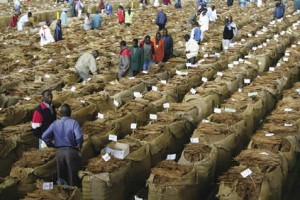Tobacco farmers satisfied with devaluation
Published on May 9, 2012 at 6:05 PM by FACE OF MALAWI
Tobacco farmers in Malawi have expressed satisfaction with the devaluation of the kwacha, describing it as a positive development.
Speaking on Monday during the opening of Mzuzu Auction Floors where the leaf’s price hit $2.20 (K550), Tobacco Association of Malawi (Tama) president Reuben Maigwa said the devaluation of the kwacha to K250 from K168 per one US dollar means tobacco farmers will realise more money from their sales.
“We want to thank government for the devaluation of the kwacha which will enable farmers to earn more,” he said.
Tobacco Control Commission (TCC) spokesperson Juliana Chidumu said it is impressed with the opening prices and encouraged farmers to bring more leaf to the market.
Recently, TCC complained that growers were hoarding tobacco while others were smuggling it to neighbouring countries owing to a strong kwacha and poor prices.
But Tama argued at the time farmers were hoarding the leaf in anticipation for the devaluation of the kwacha.
A report by World Bank titled ‘Malawi: A comprehensive Package for Competitiveness, Growth and Poverty Reduction’ and presented in Lilongwe recently revealed that the poor the Mutharika administration was claiming to protect were in fact losing billions of kwacha at the hands of an over-valued kwacha.
For example, about 91 060 of Malawi’s poorest households have lost an income of K5 billion ($20 million) due to the artificially strong kwacha, according to the bank’s report.
According to the bank, tobacco growers, who were selling their leaf in dollars and receive the kwacha equivalent at the then depressed official rate, were big losers.
This is because while tobacco growers buy farm inputs and other household needs at the real exchange rate that the World Bank calculated to be K250 then; they were selling their leaf at the auction floors based on the then official dollar rate of K168, which was a loss in kwacha terms of K83 per dollar.
With currency unification as announced on Monday—at least for groups such as tobacco growers—the farmers would significantly increase their incomes and cushion themselves against the galloping cost of living.
In this context, unification, which would basically see the kwacha devalued, is a state where the currency is allowed to float freely and be traded at its real value by its trading partners based on forces of demand and supply.
“Tobacco sales at [the exchange rate of K250/dollar] would ameliorate the loss in purchasing power significantly,” states the bank in its presentation. The bank explained that the income upgrade among tobacco growers, who are among the poorest in the country, could be as high as 65 percent.
Tobacco usd to wire in about 60 percent of Malawi’s forex, accounting for 13 of gross domestic product (GDP) and has at least two million Malawians relying on it for survival.



